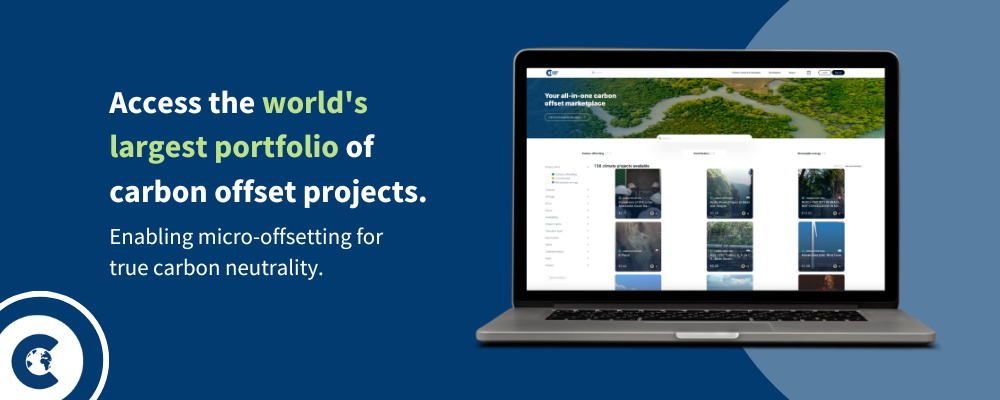Market clarity empowers businesses to leverage verified high-quality carbon offsets and maximize their net-zero goals. Explore how these offsets are measured and find the perfect fit for your sustainability journey.
The clock is ticking on climate change. With the UN’s clear warning that we need a staggering 42% reduction in global carbon emissions within the next 6 years to avoid dangerous warming, every scalable solution counts. So why do companies who voluntarily commit to reducing carbon emissions and using offsets to further enhance their impact, face so much scrutiny?
Carbon offsets have come under fire for a long time, at times rightly so. Carbon offsetting projects come in various forms, each tackling greenhouse gas emissions in unique ways. Some popular options involve forestry and conservation, where protecting existing forests or planting new trees captures carbon dioxide. Renewable energy projects, like wind or solar farms, generate clean energy, reducing reliance on fossil fuels and their emissions. Other projects focus on specific sectors, like industrial facilities reducing their emissions or communities adopting cleaner cookstoves to cut down on methane released during traditional cooking. The project type you choose can depend on your priorities, whether it’s maximizing carbon capture, supporting local communities, or promoting technological advancements.

How are high-quality carbon offsets measured?
Quantifying the long-term impact of carbon offset projects can at times be challenging, to overcome some of these obstacles there has been a surge of interest recently in permanent carbon removal projects. These involve capturing CO2 from the air or biomass and storing it securely, either geologically or by converting it into rock. Carbon Capture and Storage (CCS) is a prime example, offering a scientifically sound and verifiable approach. Sounds simple? It could be, however high-quality, permanent removal projects are currently limited and expensive. Think hundreds or even thousands of dollars per tonne compared to the much cheaper avoidance or reduction projects.
Just last week we spoke with Robin Rix, Global Chief Legal, Policy and Markets Officer at Verra. One of the world’s leading carbon registries, a non-profit that has set out to accelerate the transition to a low-carbon economy by providing trusted standards, certifications, and programs to quantify and verify greenhouse gas emissions reductions and removals. We asked him about the most impactful types of offset projects and if there is one over the other that companies should prioritize, he emphasized the importance of both emission reductions projects and removals to address the climate crisis.
Here at ClimateTrade, we advocate for responsible offset use. We believe companies should prioritize internal emission reductions while utilizing verified, high-quality carbon offsets to address what can’t be eliminated. This also means supporting the development of new permanent removal technologies. Large companies have the resources to drive innovation in this critical area, making a far greater impact than funding cheaper offset projects.
Recently, the Shell scandal involving inflated carbon credits for CCS is a harsh reminder of the need for market integrity. While CCS holds promise, it can’t be a shortcut for polluters. Transparent, verifiable projects are essential to ensure real environmental benefit. Verified and high-quality carbon offsets can be a valuable tool, but only if used with integrity and alongside aggressive emissions reductions.
Marketplace project: Enhanced rock weathering. UNDO has launched the first enhanced rock weathering project in Canada, which will be removing an estimated 300 tonnes in 2030 from work delivered by farmers to date. These operations are helping farmers to improve soil pH and boost crop yield as minerals are released into the soil.
What is the integrity council for the voluntary carbon market?
The Voluntary Carbon Market (VCM) has been under increased scrutiny for the past 18 months, but there’s positive movement. Organizations like the ICVCM are stepping up by creating frameworks like the Core Carbon Principles (CCP). These principles are boosting the quality of carbon credits and bringing transparency to the VCM. This makes it simpler for buyers to find and value trustworthy credits, regardless of who issued them, what project they support, or where they originate. Additionally, the SBTi’s recent announcement on recognizing high-quality carbon credits for reducing scope 3 emissions is a welcome development for those advocating for the VCM’s effectiveness. New regulations are anticipated to be unveiled in July.
How to choose a high-quality carbon offset program?
Before investing in a particular type of carbon offsetting project, a company should thoroughly investigate various aspects to ensure alignment with their sustainability goals and commitment to environmental stewardship. Key questions to consider include:
What are the stated goals of the project and where is it located? Understanding the project’s objectives and location provides insight into its potential impact and relevance to the company’s sustainability agenda.
Delving into the mechanisms for achieving these goals, including the specific details, baseline conditions, and scientific assumptions underlying projections, helps evaluate the project’s credibility and effectiveness.
Ownership of the land involved and community engagement are crucial factors, as they influence project legitimacy and local support. Assessing whether the local community benefits financially and how certification was conducted and documented ensures transparency and accountability.
Monitoring procedures, including who conducts them and their effectiveness, are essential for verifying emission reductions and maintaining project integrity.
Additionally, involvement of government entities, either at the national or local level, can provide regulatory support and enhance project legitimacy.
Reviewing the Sustainable Development Goals (SDGs) addressed by the project. This ensures the impact goes beyond just absorption or avoidance of emissions, but also improves communities’ lives with jobs, green economy development, etc.
A key concept to be aware of in carbon offsetting is additionality. This ensures the emissions reductions you’re paying for are real and beyond “business as usual.” Simply put, the project wouldn’t exist financially without the income from carbon credit sales. This guarantees your investment directly drives new emissions reductions that wouldn’t have happened otherwise, maximizing the climate impact of your offset purchase.
Start your carbon offsetting journey with ClimateTrade
When conducting thorough research, companies can make informed decisions and prioritize investments in high-quality carbon offsets that align with their values and contribute meaningfully to global efforts in combating climate change. Recently, we launched a new initiative ‘Carbon Offsetting Strategy As a Service’ to support businesses in their journey to net-zero in a way that is transparent and impactful. We offer a structured offsetting strategy and share our expertise to guide businesses in project selection, regulations, and crafting effective offsetting plans. Climate change is an undeniable threat, and achieving net-zero emissions is crucial for mitigating its effects. Businesses have a significant role to play, and ClimateTrade is here to help whatever stage of sustainability you’re currently facing.








